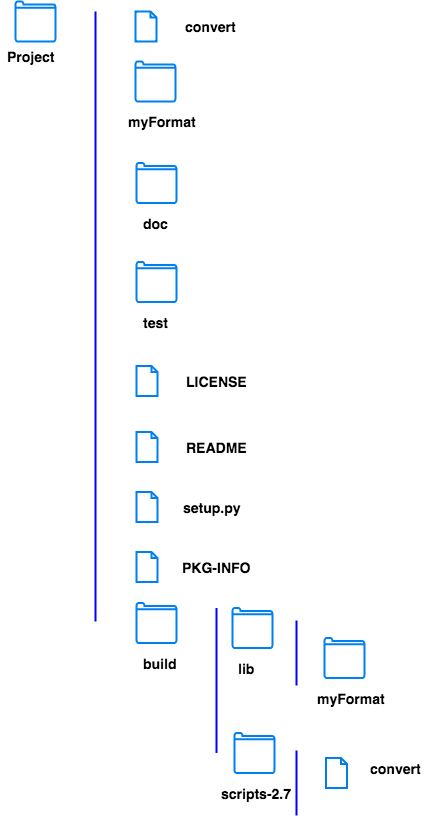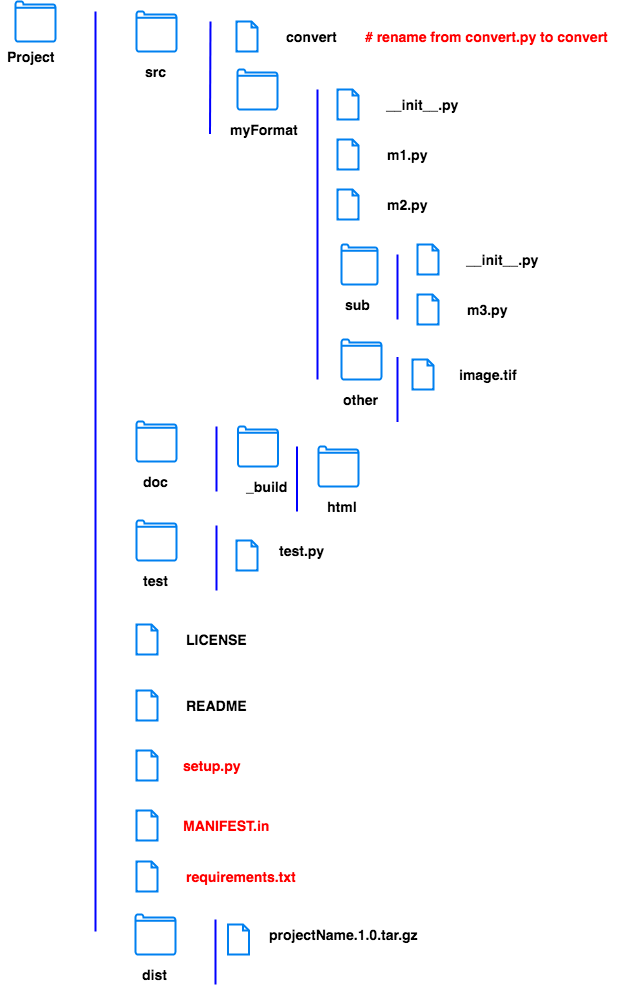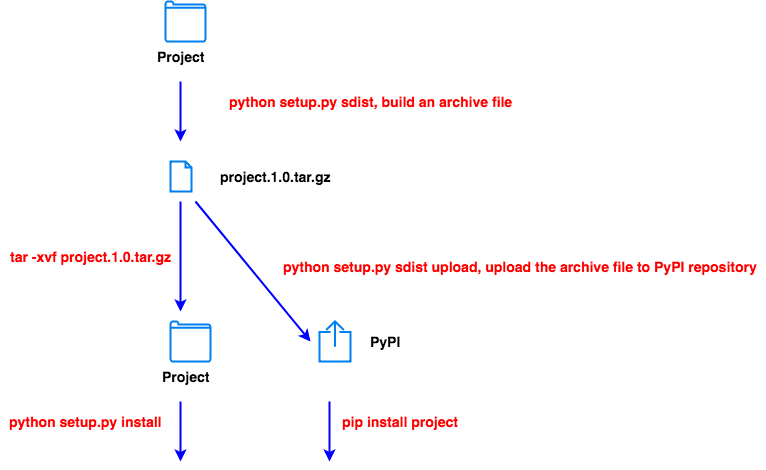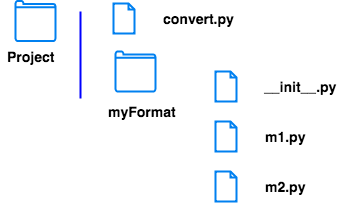Build
Benefits of packaging
Dependency management, a package management system can automatically resolve dependencies and make your installation pain free and quick
Accounting, package managers can maintain lists of things installed and other metadata like the version installed etc.
Uninstall, push button ways of removing a package from your environment
Search, find packages by searching a package index for specific terminology
distutils & PyPI
- Edit setup.py
- Edit MANIFEST.in
- python setup.py sdist, create .tar.gz archive file under /dist folder
- python setup.py sdist upload (optional), upload the archive file to PyPI with your username and password
- Installation
- python setup.py install, user download the code and install on their own computer
- pip install project, install package from PyPI repository if the archive file has be deposited to PyPI
README
This is a simple example package. You can use
[Github-flavored Markdown](https://guides.github.com/features/mastering-markdown/)
to write your content.
LICENSE, choose a license at
Choose an open source license
Copyright (c) 2018 The Python Packaging Authority
Permission is hereby granted, free of charge, to any person obtaining a copy
of this software and associated documentation files (the "Software"), to deal
in the Software without restriction, including without limitation the rights
to use, copy, modify, merge, publish, distribute, sublicense, and/or sell
copies of the Software, and to permit persons to whom the Software is
furnished to do so, subject to the following conditions:
The above copyright notice and this permission notice shall be included in all
copies or substantial portions of the Software.
THE SOFTWARE IS PROVIDED "AS IS", WITHOUT WARRANTY OF ANY KIND, EXPRESS OR
IMPLIED, INCLUDING BUT NOT LIMITED TO THE WARRANTIES OF MERCHANTABILITY,
FITNESS FOR A PARTICULAR PURPOSE AND NONINFRINGEMENT. IN NO EVENT SHALL THE
AUTHORS OR COPYRIGHT HOLDERS BE LIABLE FOR ANY CLAIM, DAMAGES OR OTHER
LIABILITY, WHETHER IN AN ACTION OF CONTRACT, TORT OR OTHERWISE, ARISING FROM,
OUT OF OR IN CONNECTION WITH THE SOFTWARE OR THE USE OR OTHER DEALINGS IN THE
SOFTWARE.
setup.py
from distutils.core import setup
setup(
name='ECSUProject_1', # a unique name for PyPI
version='0.1',
description='Demo for building a Python project',
author='Lin Chen',
author_email='lchen@ecsu.edu',
url='http://lin-chen-va.github.io', # http://location or https://location
packages=['myFormat', 'myFormat/sub', ], # packages and subpackages containing .py files
package_data={'myFormat':['other/*']}, # other needed files will be installed for user
py_modules=[], # individual modules
scripts=['convert',], # the executable files will be installed for user
license='Creative Commons Attribution-Noncommercial-Share Alike license',
long_description=open('README').read(),
# more meta-data for repository
classifiers=[
'Development Status :: 4 - Beta',
'Environment :: X11 Applications :: GTK',
'Intended Audience :: End Users/Desktop',
'Intended Audience :: Developers',
'License :: OSI Approved :: GNU General Public License (GPL)',
'Operating System :: POSIX :: Linux',
'Programming Language :: Python',
'Topic :: Desktop Environment',
'Topic :: Text Processing :: Fonts'
],
)
By default, Distutils does not include all files in your project’s directory. Only the following files will be included by default
- all Python source files implied by the py_modules and packages options
- all C source files mentioned in the ext_modules or libraries options
- scripts identified by the scripts option
- anything that looks like a test script: test/test*.py
- Top level files named: README.txt, README, setup.py, or setup.cfg
MANIFEST.in, add other files that will be included in the archive file
include README LICENSE
recursive-include doc/_build/html *
python setup.py sdist, build an archive file (.tar.gz)
Content in the archive file (.tar.gz)

Installation
Download the archive file (.tar.gz) and unpack it
python setup.py install
- anaconda/lib/python2.7/site-packages/myFormat, the location of the package installed
- anaconda/bin/convert, the location of the executable script installed
import myFormat, import the installed package
convert, run the executable script
Deposite the archive file to PyPI
Register an account at pypi.org
Add a .pypirc file under $HOME directory
[distutils]
index-servers =
pypi
[pypi]
repository: https://upload.pypi.org/legacy/
username: yourUserName
password: yourPassword
python setup.py sdist upload, deposite the archive file to PyPI repository
pip install packageName, install the package from the PyPI repository
Options of distutils
python setup.py sdist, generate project.1.0.tar.gz for Mac and Linux
python setup.py bdist_wininst, generat project.1.0.exe for Windows
python setup.py bdist_rpm, generate a rpm distribution
python setup.py install, install a package
python setup.py develop, installs your package using a symlink to your development code
Different Layout
setup.py
from distutils.core import setup
setup(
name='ECSUProject_1',
version='0.1',
description='Demo for building a Python project',
author='Lin Chen',
author_email='lchen@ecsu.edu',
url='http://lin-chen-va.github.io',
packages=['myFormat', 'myFormat/sub', ],
package_dir={'':'src'}, # set "src" as the root package
package_data={'myFormat':['other/*']},
scripts=['src/convert',],
license='Creative Commons Attribution-Noncommercial-Share Alike license',
long_description=open('README').read(),
classifiers=[
'Development Status :: 4 - Beta',
'Environment :: X11 Applications :: GTK',
'Intended Audience :: End Users/Desktop',
'Intended Audience :: Developers',
'License :: OSI Approved :: GNU General Public License (GPL)',
'Operating System :: POSIX :: Linux',
'Programming Language :: Python',
'Topic :: Desktop Environment',
'Topic :: Text Processing :: Fonts'
],
)
setuptools and PyPI
distutils does not support dependencies well, even requires is an option of setup function
python setup.py install, the dependent modules will be installed
setup.py
from setuptools import setup
setup(
name='ECSUProject_2',
version='0.1',
description='Demo for building a Python project',
author='Lin Chen',
author_email='lchen@ecsu.edu',
url='http://lin-chen-va.github.io',
install_requires=['numpy>=1.14.0', 'biopython>=1.60'], # add the dependencies
packages=['myFormat', 'myFormat/sub', ],
package_dir={'':'src'},
package_data={'myFormat':['other/*']},
scripts=['src/convert',],
license='Creative Commons Attribution-Noncommercial-Share Alike license',
long_description=open('README').read(),
classifiers=[
'Development Status :: 4 - Beta',
'Environment :: X11 Applications :: GTK',
'Intended Audience :: End Users/Desktop',
'Intended Audience :: Developers',
'License :: OSI Approved :: GNU General Public License (GPL)',
'Operating System :: POSIX :: Linux',
'Programming Language :: Python',
'Topic :: Desktop Environment',
'Topic :: Text Processing :: Fonts'
],
)
setup.py and requirements

pip freeze > requirements.txt, create a simple list of all the packages in the current environment
setup.py
from setuptools import setup
with open('requirements.txt') as f:
requirements = f.read().splitlines()
setup(
name='ECSUProject_2',
version='0.1',
description='Demo for building a Python project',
author='Lin Chen',
author_email='lchen@ecsu.edu',
url='http://lin-chen-va.github.io',
install_requires=requirements,
packages=['myFormat', 'myFormat/sub', ],
package_dir={'':'src'},
package_data={'myFormat':['other/*']},
scripts=['src/convert',],
license='Creative Commons Attribution-Noncommercial-Share Alike license',
long_description=open('README').read(),
classifiers=[
'Development Status :: 4 - Beta',
'Environment :: X11 Applications :: GTK',
'Intended Audience :: End Users/Desktop',
'Intended Audience :: Developers',
'License :: OSI Approved :: GNU General Public License (GPL)',
'Operating System :: POSIX :: Linux',
'Programming Language :: Python',
'Topic :: Desktop Environment',
'Topic :: Text Processing :: Fonts'
],
)
MANIFEST.in
include README LICENSE requirements.txt
recursive-include doc/_build/html *
python setup.py test, implement test code
python setup.py install, install modules and executable script
pyinstaller
Integrated needed external packages within the stand-alone executables
pyinstaller --onefile convert.py
- generate a executable "convert" under "dist" folder
- generate package infor under "build" folder
Reference







